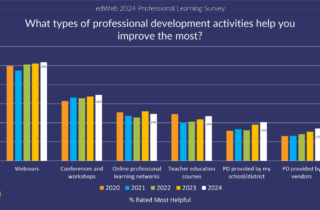edWeb has been conducting an annual professional learning survey with our members since 2016. It’s an important way we benchmark our members’ needs and assessment of our edWeb services and the state of professional learning in general. The results have been very consistent over those years, even with the COVID-19 pandemic. If anything, the need… read more →
Traditional discipline in schools can have long-term negative impacts, especially for students of color, often suspended for ambiguous and subjective reasons. Restorative discipline is a method that helps schools move beyond standard discipline to improve behavior equitably and in culturally responsive ways.
The number of students with significant needs has grown, and schools must address the needs of all students. During the edLeader Panel “Today’s MTSS Classroom: Meeting the Instructional Needs of ALL Students,” experts and school district leaders came together to discuss instructional models to help all students learn.
Family communications programs are critical for student support. However, many times these well-intentioned efforts don’t effectively engage parents and caregivers because they don’t actually reflect the needs of the different members of the school community.
Teacher retention is one of the most difficult challenges faced by districts today. “Half of teachers leave teaching within five years,” said Hillary Greene Nolan, Education Researcher at Digital Promise. It raises the question: How do we retain experienced teachers and welcome new educators? One answer just might be “Teacher Leadership in a Union-Led Program Designed to Support and Retain Early-Career Teachers.”
As students progress through the upper elementary grades and into middle school, many are becoming caught in a negative feedback loop, with their limited understanding of math facts and underlying concepts resulting in poor grades and a lack of engagement, making successful math learning even less likely to occur.
Five critical guidelines, identified by CoSN in partnership with AASA as part of the EmpowerED Superintendents’ Initiative, provide a framework to ensure data privacy within a school district’s use of technology.
Addressing Tier 3 behavior can be challenging, but utilizing a Multi-Tiered System of Support (MTSS) can make successful intervention planning both possible and practical in any size district.
Settling into the U.S. as a newcomer is challenging. It requires learning and adapting to new systems and institutions, especially schools. Navigating the transition to school calls for inclusive and welcoming practices that immigrant families can also inform.
Cybersecurity is an in-demand, growing field, so it falls to schools to help students enter the industry. The inequities faced by different students make this a challenge, which Digital Promise’s Inclusive Cybersecurity Pathways Cohort strives to address.











